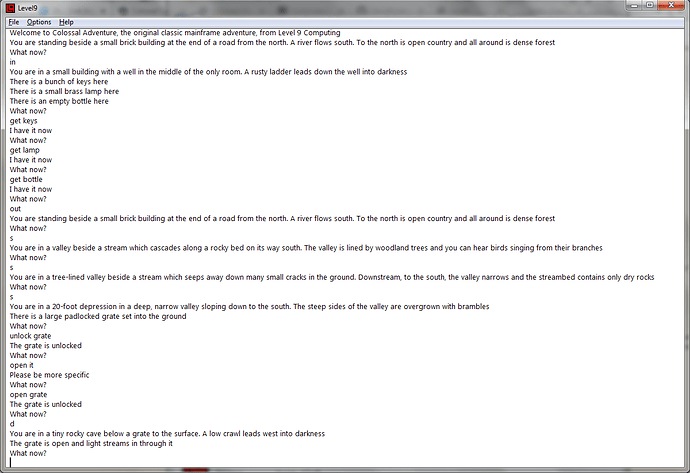I’m a little disappointed that Level 9 didn’t get as much love as Infocom over the years, as using some version of their system would have been ideal.
I presume that by “didn’t get as much love”, you are talking about the fact that nobody has reversed engineered the system and come up with Inform-type system that compiles to Level 9’s A-Code, which I agree with totally.
I hadn’t considered using the Scott Adams tools, as I only ever played Adventureland back in the day, so don’t really know what his later games were like to play. I’ll see what I can find out about them.
Here in the UK, outside of the earlier imported TRS-80 releases, the versions of Scott Adams games we played on our home micros were the ones created by Brian Howarth. He started with his own adventure system which he then later tweaked so it would be compatible with Scott’s. His versions of Scott Adams’ games, and his own epic Mysterious Adventures series, were released on a fairly wide range of tape-based formats; including at one point the 8K Vic-20. (He was never satisfied with those versions, though,) Ref: Molimerx's Mysterious Adventures
Many of the first 8-bit machines had less than 64Kb of RAM. The first Dragon had only 32Kb and some models of the Spectrum had just 16Kb. I would love to be able to create at least some games that fit into 16Kb.
You should be able to get something that fits into 16K yes, as long as your realistic. The early Level 9 games were released in 16K tape versions. (A lot less text and much heavily compressed than the ones most people are familiar with… Sadly none of those early versions survive so we can’t compare them with the 32K+ versions). Level 9 16K Text Adventures
There were even some other decent attempts at fitting the full Colossal Cave into 16K. e.g. Syrtis Adventure
Disk drives for early machines were rare in the UK and probably even rarer now. Physical machines that could use a standard cassette player (rather than a dedicated one) should be able to load and save using a digital recording device though.
It’s obviously not considered “a thing” by users on here, but tape is still really important in the UK retro computing community. There are lots (and lots) of physical game releases on tape every year… including quite a few text adventure games.
I did take a look at DAAD, but (as several of you already mentioned) the source for the interpreters is not available and it only supports the most popular machines.
There are people making new interpreters for DAAD. As I mentioned previously, a lot of the work is spearheaded by the clever chaps in the Spanish “conversational adventure” community who have worked for years creating retro-flavoured adventure writing systems. I doubt that any of your obscure platforms would be on the list. DAAD only really makes sense with 48K plus of memory.
Creating several BASIC interpreters would be problematic, as BASIC itself was interpreted on the platforms I’m hoping to target. This means that BASIC itself eats up a lot of available memory and is quite slow.
It can be slow, yes, but you’re going to have to trade something somewhere in order to hit your more obscure choice of target platforms… It’s going to be a choice of compromising on speed or on game-size. Or ultimately, I suspect, on the platforms supported.
It might be worth investigating adventures that currently exist for the target platforms, including the non-official ports of games from other systems.
Another issue would be that almost every manufacturer had their own dialect.
This is true but, as other posters have pointed out, there is an overlap and supporting/working with multiple dialects was very much published adventure systems did back in the day. There are still people out there who enjoy porting text adventures from one form of BASIC to another. Check out Jim Gerrie’s work here, for example Type-in Mania: Text Adventurers
I believe that Pascal compilers were available for some systems, but I’m not sure how easy they would be to get hold of these days.
On Z80 processors, C tends to be the language of choice, cross-compiling with z88dk, see Davide Bucci’s work for an example of that… he’s supporting something like 18 different platforms at the moment… Silk Dust - Davide Bucci
It might be useful touching base with people like Davide who have been on similar journeys.
I was hoping to avoid creating a new system from scratch, but it’s starting to look like my only option.
That will ultimately give you more control, but it would be a lot of work… definitely more than dealing with a few different dialects of BASIC!
Good luck, anyway! Always interesting to see people develop for a range of 8-bit machines. Tape-based text adventure gaming is where my 100% of my interest lies.
